- Home
- Lin Carter
Thongor Fights the Pirates of Tarakus
Thongor Fights the Pirates of Tarakus Read online
THONGOR FIGHTS THE PIRATES OF TARAKUS
Lin Carter
www.sfgateway.com
Enter the SF Gateway …
In the last years of the twentieth century (as Wells might have put it), Gollancz, Britain’s oldest and most distinguished science fiction imprint, created the SF and Fantasy Masterworks series. Dedicated to re-publishing the English language’s finest works of SF and Fantasy, most of which were languishing out of print at the time, they were – and remain – landmark lists, consummately fulfilling the original mission statement:
‘SF MASTERWORKS is a library of the greatest SF ever written, chosen with the help of today’s leading SF writers and editors. These books show that genuinely innovative SF is as exciting today as when it was first written.’
Now, as we move inexorably into the twenty-first century, we are delighted to be widening our remit even more. The realities of commercial publishing are such that vast troves of classic SF & Fantasy are almost certainly destined never again to see print. Until very recently, this meant that anyone interested in reading any of these books would have been confined to scouring second-hand bookshops. The advent of digital publishing has changed that paradigm for ever.
The technology now exists to enable us to make available, for the first time, the entire backlists of an incredibly wide range of classic and modern SF and fantasy authors. Our plan is, at its simplest, to use this technology to build on the success of the SF and Fantasy Masterworks series and to go even further.
Welcome to the new home of Science Fiction & Fantasy. Welcome to the most comprehensive electronic library of classic SFF titles ever assembled.
Welcome to the SF Gateway.
Contents
Title Page
Gateway Introduction
Contents
Author’s Note
Book One: The Storm Gathers
Chapter 1: The Ship of Howling Men
Chapter 2: Black Hawk’s Ring
Chapter 3: The Gray Magicians
Chapter 4: Dragons of the Deep
Book Two: The Storm Breaks
Chapter 5: Red Wolf of Tarakus
Chapter 6: Dark Wisdom from Earth’s Dawn
Chapter 7: The Face at the Window
Chapter 8: River of Terror
Chapter 9: Swords Against Patanga
Book Three: Against the Storm
Chapter 10: Yian of Cadorna
Chapter 11: The Armada of Doom
Chapter 12: When Comrades Meet
Chapter 13: Magic Mist
Chapter 14: Naked Steel
Book Four: The Storm Passes
Chapter 15: The Golden Dragon
Chapter 16: The Ray of Madness
Chapter 17: Kashtar’s Doom
Chapter 18: To the Death!
Chapter 19: Kings of the West
Appendix: The Aeon of the Gray Magicians
Website
Also by Lin Carter
Dedication
About the Author
Copyright
Author’s Note
According to the occultists, the first civilizations of man upon this planet came into being half a million years ago on the Lost Continent of Lemuria in the blue Pacific.
Of these kingdoms of the dawn—now long since forgotten and but vaguely whispered of in scraps of elder legend and ancient myth—the mightiest was The Golden Empire of the Sun. To the Lemurians themselves it was the Shamgamma, the Great Union. Although I have translated the term as “empire” it actually bore very little resemblance to the general meaning of that word. It seems to have been a league of free cities which acknowledged the King of Patanga as their Overlord. (Incidentally, some authorities believe the ancient Lemurian language was among the ancestors of early Sanskrit. This may or may not be true, but there exists an interesting parallel between the Lemurian word Shamgamma, Great Union, and the old Sanskrit samgam, which means monad or unity.)
According to such prehistoric legendary Indian epics as the Puranas, this Golden Empire of the Sun was founded by a wandering barbarian adventurer whom I have called Thongor. I have recorded a history of his adventures in a series of fantastic novels of which Thongor Fights the Pirates of Tarakus is the sixth.
This book takes place three years after the events narrated in Thongor at the End of Time, in the late fall of the Year of the Kingdoms of Man seven-thousand-and-twenty.
—LIN CARTER
BOOK ONE
THE STORM GATHERS
“Below the Gulf of Patanga, aye, where it mingles with the immeasurable waters of Yashengzeb Chun the Southern Sea, there stands a great promontory of rock whereon is builded Tarakus the Pirate City, a lawless and bloody realm that knoweth no rule save the lust of gold. Therefrom, in the long years ahead, a peril shall rise up to enshadow the Cities of the West, so beware, O Thongor … take warning and beware.”
—The Great Book of Sharajsha the Wizard
CHAPTER 1:
THE SHIP OF HOWLING MEN
A strange dark ship, at the death of day,
With a crew of howling men,
Who had looked on hell and come away,
But were no longer men …
—The Tsargol Records
IT was the month of Zorah, the third month of fall, in the twelfth year of the reign of Thongor the Mighty over the Six Cities, when a ship came slowly into the harbor of Tsargol at sundown.
Night was almost come and the sun lay dying in a welter of crimson athwart the shadowy west. Slowly the purple wings of night rose up over the edges of the earth to enshroud the world in darkness. The first stars flickered pale and dim against the dusk. Soon Illana the Moon-Lady would ascend the heavens to flood all the land with her cold shimmering glory, but not yet, for still bright Aedir the Sun-god ruled the skies from his deathbed of royal crimson in the darkling west.
The red stone city of Tsargol rose on the wave-lashed shores of the southern Sea. Tall towers and stout walls guarded it from assault; proud palaces and stately temples displayed the wealth and power of the City of the Sea; its populace enjoyed the mild autumn evening on terraces and in luxurious gardens, and strolled at leisure along the broad stone-paved avenues.
The ship crept into the harbor and at first few saw it for no lamps twinkled at mast-head or prow. The mighty trireme was a moving shape of shadows as it glided slowly through the dark waters. It passed the mole and came within the mighty sea wall that encircled the man-made harbor in sheltering arms of stone. Then it was that a keen-eyed watchman high on the walls of-Tsargol spied the slowly moving ship and gave the alarm.
Gongs roared. Torches flared. Spearmen seized up burning brands and went pelting down the spray-wet stone steps to the sea wall to learn what mariner dared enter the harbor of Tsargol without lamps burning or flags aloft.
The huge trireme slowly crossed the harbor. Watchful eyes traced its passage and strong hands tightened on spear and bow and swordhilt. Otars in command of a hundred warriors passed grim orders to waiting messengers. A herald sprang astride a kroter and drove his knees into the scaly ribs of the swift-footed reptile and rode clattering off to the palace of Karm Karvus, Lord of the City.
It was not surprising that the unexpected appearance of one ship should cause such consternation and alarm, for these were the southern coasts and all these lands went in dread of the bold and rapacious corsairs of Tarakus the Pirate City. No ship was safe on these buccaneer-infested waters and no port could feel fully secure. That lone trireme might well be the advance scout of the terrible armada of Tarakus. In its wake a hundred slim black hulls might cruise, swarming with bloody pirates eager to rape the wealth of fabulous Tsargol.
At
length it was perceived that the intruder was unaccompanied. And sharp eyes soon guessed the mighty trireme was in trouble. For her triple oarbanks were largely unoccupied and the swinging stroke of oars dipped in unison—which should have driven the great ship forward with a smooth, gliding progress—moved instead to a broken rhythm. The oars were plied by few hands, and awkwardly. She moved slowly, crabwise, and at times her prow skewed about and she wallowed against the waves.
Soon other eyes noted that her sails were torn and partly furled, but bound up all wrong and crudely. As she drew nearer to the long stone quays that thrust out from the inner crescent of the harbor, it was observed that her rail was smashed and broken, gilded wood crushed and torn away, and that the mighty dragon’s head of her prow was broken and shoved askew.
And as she came nearer to the quays, a faint horrible sound came to the ears of the Guardsmen who stood waiting to board her. It was a hideous ululation. It rose and fell, a moaning terrible and unnerving to hear. Otar looked at Otar with eyes wide with horror. The men of the dark, crippled ship were … howling …
Then one young officer saw with a sudden thrill of alarm that the oars were not back-sweeping to ease the trireme into her berth, but, instead, still swept her forward in that crippled, arhythmic progress. He raised a shout of alarm.
“Board ship—’ware the quay! Back water, you fools, before you hit the—”
His sudden shout was drowned in a mighty grinding and buckling of timbers as the strange ship drove full against the side of the stone dock. The impact made the granite quay shudder underfoot, The ship lurched—skewed drunkenly—and came to a dead halt. One sail came crashing down and the mast creaked alarmingly, and splintered with a deafening screech of tearing oak. Then all was still.
But the men howled on. A mournful, hellish chorus like the groans of the damned, whimpering and mewling under the torments of demons.
Among the spearsmen, men cursed and paled and gripped their weapons tighter, knuckles whitening from the strain. Was the strange dark ship peopled by madmen? Or had it drifted into human seas from the crimson throat of hell itself, manned by the accursed? Were they madmen—or ghosts—aboard the weird craft that had come out of the unknown watery wastes in the hour of sunfall?
Hooves clattered against the cobbles, and Karim Ptole the Commander of the Port came into view, gold helm glittering in the streaming torchlight.
“Ho, there, Otar! Secure the trireme and get your men aboard. You, there! Get a rope around her prow before she grinds half her hull to splinters against the quay! Swiftly, you men!”
A grizzled Daotar, commander of ten companies, strode to where the Commander sat astride his pacing kroter. The gray-bearded officer saluted stiffly with one balled fist against his heart.
“What think you?” growled Karim Ptole harshly. “Plague—or piracy?”
The Daotar squinted in the flickering torchfire, as warriors made the trireme secure with tossed grapnels, roped her to the piles, and swarmed aboard, swords ready. He grunted and spat.
“The sea wolves of Tarakus sink their prey,” he observed grimly. “Seldom do men escape their clutches once the crimson flag is hoisted aloft and the black hulls glide in for the kill. In truth, Lord, I know not what to make of this … mayhap a sea monster attacked the trireme and savaged what it could not eat?”
“Perchance,” Karim Ptole growled. “But … there is something devilishly familiar about that craft, the lines of her, the curve of her prow … almost I could swear I had laid my eyes on her before …”
“Well, perchance you have, Lord,” the old Daotar mused. “I, too, feel I have known the lines of her … that brightwork on the afterdeck, those carven and gilded dolphins sporting along her rail in a running frieze …”
His pale eyes narrowed thoughtfully.
“Yet she’s no naval craft, that’s for sure, and no merchantman either, with that keel. Some princeling’s royal yacht? Some fat admiral’s pleasure-ship, mayhap?”
The mounted Commander shook his head, helm glittering.
“Almost she reminds me of the Crown of Tsargol herself,” he muttered. “But Prince Karm Karvus, our lord and master, took her to sea three days ago for a visit-of-state to Vozashpa, so it could not be—”
He broke off and his face went pale under his bronze tan. At the same instant, the Daotar who stood at his stirrup, squinting through the gathering darkness at the mauled and splintered prow stifled a sharp cry of horror as he made out the glyphs of the trireme’s name written in gold thereupon.
The Crown of Tsargol …
THE young Otar, Jorn Javas, was the first aboard the mystery ship. He sprang up and seized one of the ropes and swung up and over the rail and down into the oarbanks. He stopped short at what he saw, with a gasp of astonishment and horror.
Corpses were strewn about the benches. Their gore smeared the broken oars and besplattered the decks. They had not died easily.
He peered closer, striving to make out elusive details through the gloom. He reached down and turned one body over.
The tanned and bearded face of a sailor stared up at him, eyes wide and glaring and awful. Soapy foam smeared the dead man’s lips, which were drawn back in a frozen rictus, half snarl and half grin. The man’s throat had been cut from ear to ear. And the dirk that had done the deed was clenched in the man’s own hand.
His face grim and set, Jorn Javas prowled the benches, examining the dead. Some had died at their own hands, but others had died locked in battle with their own comrades. He turned shuddering away from one ghastly sight: two mariners still tangled in each others’ arms, their teeth sunk deep in each other’s throats …
But not all were dead. Some there were who yet lived. And the sight of them was more terrible than the sight of the mangled dead.
They sat idly, hands on their oars, and peered at him strangely when he spoke to them. Some wept; others laughed wildly. Jorn Javas went from man to man, gazing into blood-smeared faces, glazed and vacant eyes, mouths that drooled and slobbered. He knew that they were mad. From the mindless men at the oars a moaning sound rose and fell, rose and fell, from a mournful sobbing to a howling like the baying of tormented animals.
Though young, Jorn Javas was no white-fingered recruit but a seasoned veteran. He had slain men in his time, and he had looked on the ugly visage of war and siege and assault. Dead men he had seen and not a few of them: men mangled by the engines of war and men gruesomely mauled by torture. None of those grim sights had moved him so terribly as did the nightmare decks of this dark ship from hell.
White faced, he turned and was sick, rackingly, horribly sick. Then he roused himself and continued his search of the ship.
The decks were strewn with bloody bodies, with dead men and with mewling, sobbing madmen. In their mindless fury they had wreaked great damage to the ship, which was accoutered for the pleasures of some mighty prince. Jorn Javas found smashed doors and torn brocades and silken hangings befouled with human offal. Bodies were tossed about, huddled in corners, spread-eagled on floors, hunched over bundles of rigging.
One man, at least, had resisted madness to the end.
It was the captain of the vessel, from his great crimson coat and gold brocade. A seasoned and experienced mariner, from the looks of him. There was decision and strength and command in the set of his bearded jaw, breeding and intelligence in his clear eyes and well-proportioned brow.
Jorn Javas found him at the wheel. He had tied himself to it with thongs from his warrior’s harness, bound himself into position with great cunning. His hands, black and swollen now from lack of circulation, were clamped onto the spokes of the wheel, and he was slumped across it, his head fallen upon his chest.
A start of pure horror went through the young officer as he gazed on this man … for he knew him!
It was Norgovan Thul, lord high Admiral of Tsargol!
But Norgovan Thul had sailed for Vozashpa days ago in the company of Prince Karm Karvus, lord of the City, aboard the
Crown of Tsargol, flagship of the fleet, the Prince’s own ship … a great trireme very much like this one. But this charnel ship, crewed with the dead and with the living dead, befouled with blood and wreckage, could not be the proud gilded trireme that had put to sea days before, bearing the Prince of Tsargol on a visit-of-state to the throne of Vozashpa … or could it?
His heart in his mouth, the pale young officer turned to look about the deck with a dawning comprehension in his eyes. That brightwork on the afterdeck, that frieze of gilt and carven dolphins running along the rail—his gaze flashed to the door of the great cabin and saw embossed thereupon the crossed sword-and-anchor that was the royal emblem of Tsargol, her standard and ensign.
It was then that the full impact of the awful truth crashed upon the mind of Jorn Javas.
On unsteady legs he crossed the cadaver-strewn deck to the door of the great cabin. With nerveless and trembling fingers he fumbled at the lock. The great carven door swung open slowly and Jorn Javas peered within, dreading what he might see … for if sudden insanity and inexplicable death had struck down the crew and officers of the royal flagship, how could the Prince have survived untouched by either the red hand of murder or the white touch of madness?
But the cabin was empty.
The Otar searched it from wall to wall, but he found not the body of Karm Karvus.
Slowly he made his way back to the deck and to the place where the body of Norgovan Thul was tied to the wheel.
The Admiral was not dead, as Jorn Javas had first surmised. For the older man lifted his head and turned his face, smeared with a ghastly dew of mingled sweat and blood, at the young officer. He peered at Jorn Javas with wide haunted eyes through a matted tangle of wet locks.
“My Lord … you live? What… happened here?” he asked.
The reply came slowly in a dull croaking voice.
“… The Gray Death … the Gray Death …” the Admiral groaned.
Jorn Javas cut the other down with his blade, slicing through the thongs which bound him to his post, thongs which had sunk deeply into his flesh and which had left cruel marks therein. He eased the older man to a place on the deck, pillowed the man’s head on his knees and gave him to drink of water from the cannister at his hip.

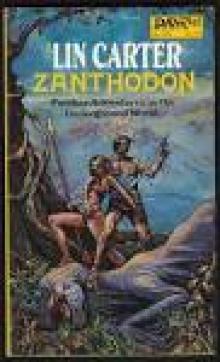 Zanthodon
Zanthodon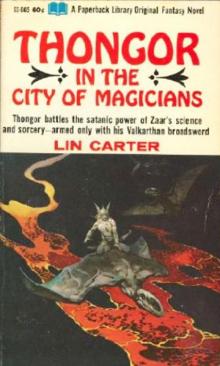 Thongor in the City of Magicians
Thongor in the City of Magicians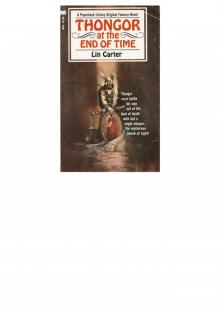 Thongor at the End of Time
Thongor at the End of Time The Valley Where Time Stood Still
The Valley Where Time Stood Still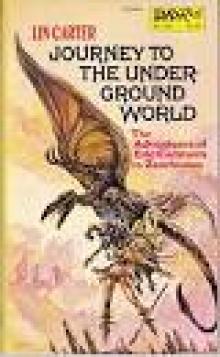 Journey To The Underground World
Journey To The Underground World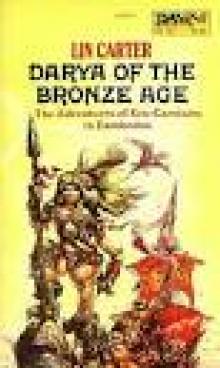 Darya of The Bronze Age
Darya of The Bronze Age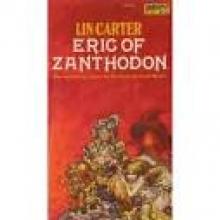 Eric of Zanthodon
Eric of Zanthodon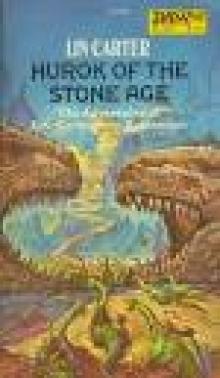 Hurok Of The Stone Age
Hurok Of The Stone Age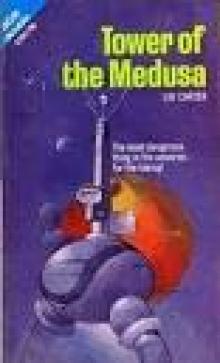 Tower Of The Medusa
Tower Of The Medusa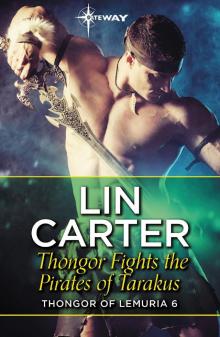 Thongor Fights the Pirates of Tarakus
Thongor Fights the Pirates of Tarakus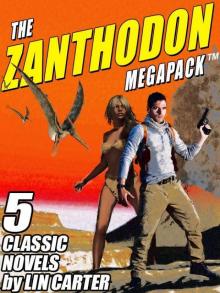 The Zanthodon MEGAPACK ™: The Complete 5-Book Series
The Zanthodon MEGAPACK ™: The Complete 5-Book Series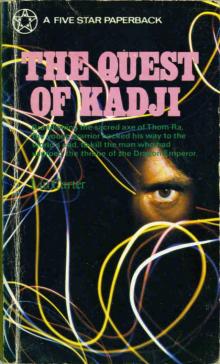 The Quest of Kadji
The Quest of Kadji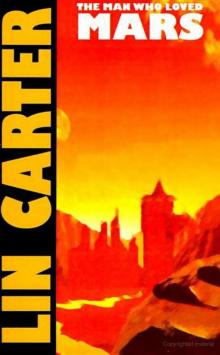 Lin Carter - The Man Who Loved Mars
Lin Carter - The Man Who Loved Mars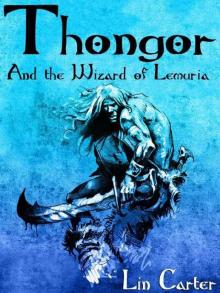 Thongor and the Wizard of Lemuria
Thongor and the Wizard of Lemuria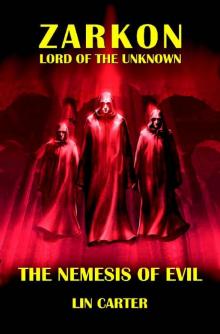 The Nemesis of Evil
The Nemesis of Evil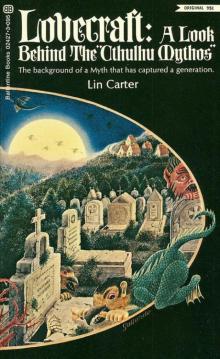 H.P.Lovecraft: A Look Behind Cthulhu Mythos
H.P.Lovecraft: A Look Behind Cthulhu Mythos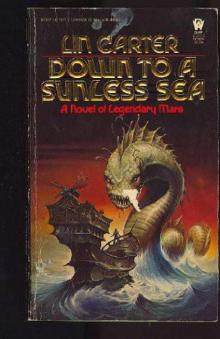 Lin Carter - Down to a Sunless Sea
Lin Carter - Down to a Sunless Sea Horror Wears Blue
Horror Wears Blue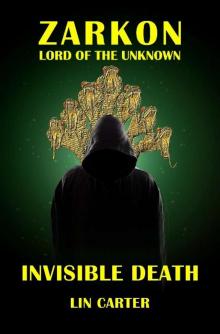 Invisible Death
Invisible Death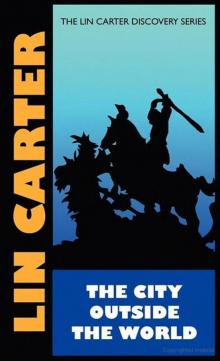 Lin Carter - The City Outside the World
Lin Carter - The City Outside the World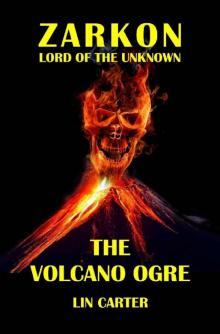 The Volcano Ogre
The Volcano Ogre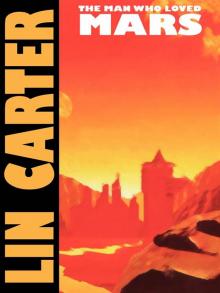 The Man Who Loved Mars
The Man Who Loved Mars